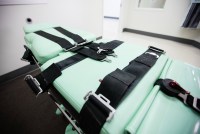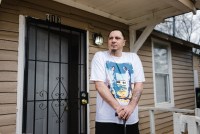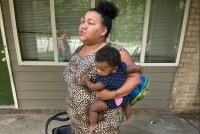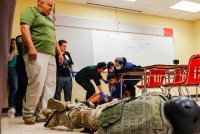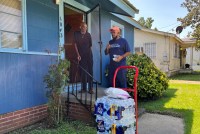Parents See Own Health Spiral as Their Kids’ Mental Illnesses Worsen
The day-to-day struggles that parents of kids with mental health conditions must navigate have led to their own crisis: The stress can take a physical toll that disrupts parents’ ability to provide care, say psychologists, researchers, and advocates for families.
The Painful Legacy of ‘Law and Order’ Treatment of Addiction in Jail
Efforts to improve addiction care in jails and prisons are underway across the country. But a rural Alabama county with one of the nation’s highest overdose rates shows how change is slow, while law enforcement officials continue to treat addiction as a crime rather than a medical condition.
As More Hospitals Create Police Forces, Critics Warn of Pitfalls
Nearly 30 states have active or proposed laws authorizing independent hospital police forces. Groups representing nurses and hospitals say the laws address the daily realities of patients who become aggressive or agitated. But critics worry about unintended consequences.
Expectant Mom Needed $15,000 Overnight to Save Her Twins
Doctors rushed a pregnant woman to a surgeon who charged thousands upfront just to see her. The case reveals a gap in medical billing protections for those with rare, specialized conditions.
States Try to Obscure Execution Details as Drugmakers Hinder Lethal Injection
Pharmaceutical companies have put the brakes on many states’ ability to execute prisoners using lethal injections. Lacking alternatives, states are trying to keep the public from learning details about how they carry out executions.
Reentry Programs to Help Former Prisoners Obtain Health Care Are Often Underused
More than 600,000 people are released from prisons every year, many with costly health conditions but no medications, medical records, a health care provider, or insurance.
Some Addiction Treatment Centers Turn Big Profits by Scaling Back Care
Private equity groups are cashing in on rising rates of alcohol and drug addiction in the U.S. But they aren’t necessarily investing in centers with the best treatment standards, and they often cut extra services.
Inmigrantes detenidos en centros enfrentan riesgo de covid como al inicio de la pandemia
Para las aproximadamente 30,000 personas que viven en espacios cerrados en la red de instalaciones de detención de inmigrantes del país, covid sigue siendo una amenaza constante.
‘Caged … For No Fault of Your Own’: Detainees Dread Covid While Awaiting Immigration Hearings
Covid remains a threat for the roughly 30,000 people in the country’s network of immigration facilities. But ICE continues to flout its own pandemic protocols, an extension of the facilities’ poor history of medical care.
Her Apartment Might Have Put Her Son’s Health at Risk. But ‘I Have Nowhere Else to Go.’
The United States is suffering from a severe shortage of affordable housing. But elected officials have done little to fix a problem that puts many Americans at greater risk for sickness and shortens lives.
Patient Mistrust and Poor Access Hamper Federal Efforts to Overhaul Family Planning
For decades, many women of color, particularly those with low incomes, had little control over their family planning care. Now, a White House effort aims to give patients more choices as abortion care evaporates, but patients remain wary of providers.
Texas Revamps ‘Active-Shooter’ Drills at K-12 Schools to Minimize Trauma
School lockdown drills are designed to prepare students for violent threats. But for some students, especially those with special needs, the drills can trigger or exacerbate mental health problems. Texas is taking a step toward balancing safety and mental health with new regulations around how the drills are conducted. “If some kids are coming away traumatized or we’re magnifying existing trauma, we’re not moving in the right direction,” one expert says.
In Jackson, the Water Is Back, but the Crisis Remains
Unsafe water and all that comes with it — constant vigilance, extra expenses, and hassle — complicate every aspect of daily life for residents of Jackson, Mississippi. Health advocates say stress exacerbates underlying health problems. That is why a free clinic in one of Jackson’s poorest neighborhoods has been organizing water giveaways for the past year and a half.
La salud de los inmigrantes se quiebra, y empeora, mientras esperan en refugios fronterizos
La espera, que puede durar meses, hace que algunos migrantes desarrollen problemas de salud. Han aumentado las dolencias crónicas, como la hipertensión o la diabetes.
Shelter Sickness: Migrants See Health Problems Linger and Worsen While Waiting at the Border
U.S. immigration policies, an increasing number of migrants, and the covid-19 pandemic have led to the growth of the Mexican shelter system, in which people are getting sick and medical care is limited.
‘Still a Lot of Pain’: Four Years After Mass Shooting, Texas Community Grapples With Fallout
Santa Fe, Texas, was a mental health care desert until a 17-year-old gunman killed 10 people at the local high school in 2018. Now the city, which sits in a rural stretch between Houston and Galveston, has a resiliency center, where anyone affected by the shooting can get free counseling. But even with an influx of mental health care, the community struggles with the aftermath.
Datos de las sobredosis, obtenidos por colaboración colectiva, resaltan en dónde hace falta la ayuda
El proyecto de la Universidad de Texas, llamado TxCOPE, busca resolver un problema que mantiene en vilo a los funcionarios de todo el país en su esfuerzo por reducir el número récord de muertes por drogas: obtener una imagen clara y precisa de las sobredosis no mortales y mortales.
Crowdsourced Data on Overdoses Pinpoints Where to Help
University of Texas researchers are testing a program that would allow harm reduction groups to crowdsource data on fatal and nonfatal drug overdoses statewide. While the data relies on word of mouth, they say, it is more comprehensive than anything that exists now and can be used immediately to prevent overdoses.
As Biden Fights Overdoses, Harm Reduction Groups Face Local Opposition
The Biden administration’s latest plan to address opioid overdose deaths includes $30 million for harm reduction measures, but many conservative states don’t allow them.







